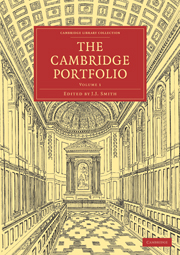Book contents
- Frontmatter
- DIRECTIONS FOR PLACING THE PLATES
- DESCRIPTION OF THE WOODCUTS
- LIST OF SIGNATURES
- ERRATA
- PREFACE
- INTRODUCTORY
- THE FIRST MILESTONE FROM CAMBRIDGE
- THE APPROACH AND PRINCIPAL AVENUE
- THE WALKS
- THE INSTALLATION IN 1835
- SOURCES OF HISTORY. I
- SOURCES OF HISTORY. II; COLLEGE HISTORIES
- A DREAM OF THE POETS
- MEMORIAL OF GONVILLE AND CAIUS COLLEGE
- FOVNDERS. I
- THE BOTANICAL GARDEN
- THE GOGMAGOGS
- TRINITY COLLEGE CHAPEL
- ON THE ANCIENT AMUSEMENTS OF THE UNIVERSITY
- A LEGEND OF THE HILLS
- SIGHED ON KING'S BRIDGE. OCT. 1838
- THE CAMBRIDGE PHILOSOPHICAL SOCIETY
- MUSEUM OF THE CAMBRIDGE PHILOSOPHICAL SOCIETY
- NOTICE OF WILLUGHBY
- THE BOAT-RACE
- NEVILLE'S COURT
- CRITIQUE ON GRAY
- AN INDEPENDENT TRIBUTE TO THE MEMORY OF THE RIGHT HON WILLIAM PITT
- SOURCES OF HISTORY. III: PRIVATE COLLECTIONS
- FOVNDERS. II
- PORTRAITURE OF DR. CAIUS
- THE UNION DEBATING SOCIETY
- ALABASTER
- CLARE HALL
- ORGANS
- POSTSCRIPT TO THE LEGEND OF THE HILLS
- ANECDOTES
- MILTON'S MULBERRY TREE
- BIOGRAPHICAL NOTICES
- The Cambridge Portfolio pp. 216-236
- VOCABULARY. I
- DR. LEGGE
- READING PARTIES
- THE CAM
- ANCIENT BRICK
- THE WOODWARDIAN MUSEUM
- THE COLLEGE COURSE
- THE CLUBS OF CAMBRIDGE
- OLD PLATE
- THE GARDEN AND COURTS OF GONVILLE AND CAIUS COLLEGE
- Plate section
- Frontmatter
- DIRECTIONS FOR PLACING THE PLATES
- DESCRIPTION OF THE WOODCUTS
- LIST OF SIGNATURES
- ERRATA
- PREFACE
- INTRODUCTORY
- THE FIRST MILESTONE FROM CAMBRIDGE
- THE APPROACH AND PRINCIPAL AVENUE
- THE WALKS
- THE INSTALLATION IN 1835
- SOURCES OF HISTORY. I
- SOURCES OF HISTORY. II; COLLEGE HISTORIES
- A DREAM OF THE POETS
- MEMORIAL OF GONVILLE AND CAIUS COLLEGE
- FOVNDERS. I
- THE BOTANICAL GARDEN
- THE GOGMAGOGS
- TRINITY COLLEGE CHAPEL
- ON THE ANCIENT AMUSEMENTS OF THE UNIVERSITY
- A LEGEND OF THE HILLS
- SIGHED ON KING'S BRIDGE. OCT. 1838
- THE CAMBRIDGE PHILOSOPHICAL SOCIETY
- MUSEUM OF THE CAMBRIDGE PHILOSOPHICAL SOCIETY
- NOTICE OF WILLUGHBY
- THE BOAT-RACE
- NEVILLE'S COURT
- CRITIQUE ON GRAY
- AN INDEPENDENT TRIBUTE TO THE MEMORY OF THE RIGHT HON WILLIAM PITT
- SOURCES OF HISTORY. III: PRIVATE COLLECTIONS
- FOVNDERS. II
- PORTRAITURE OF DR. CAIUS
- THE UNION DEBATING SOCIETY
- ALABASTER
- CLARE HALL
- ORGANS
- POSTSCRIPT TO THE LEGEND OF THE HILLS
- ANECDOTES
- MILTON'S MULBERRY TREE
- BIOGRAPHICAL NOTICES
- The Cambridge Portfolio pp. 216-236
- VOCABULARY. I
- DR. LEGGE
- READING PARTIES
- THE CAM
- ANCIENT BRICK
- THE WOODWARDIAN MUSEUM
- THE COLLEGE COURSE
- THE CLUBS OF CAMBRIDGE
- OLD PLATE
- THE GARDEN AND COURTS OF GONVILLE AND CAIUS COLLEGE
- Plate section
Summary
William Alabaster, born at Hadleigh in Suffolk, was a Fellow of Trinity College. His University career is remarkable for his having kept a Greek Act with Francis Dillingham, B.D. of St. John's College. Having been appointed chaplain to Robert Earl of Essex, he attended him in his voyage to Calais on a projected expedition to assist Henry IV. against the League, in the year 1591. While in France, he was induced to change his church and to become a Roman Catholick; he soon, however, became dissatisfied with his new persuasion and returned to his former opinions. In the preface to his work entitled “Ecce sponsus venit,” he relates that, certain doctrines of his having become obnoxious to the Court of Rome, he was enticed to that city and imprisoned there by authority of the inquisition; on his liberation, he was confined to the city-walls, but escaping at the peril of his life he returned to England, and soon after became Prebendary of St. Paul's and Rector of Hatfield, in Hertfordshire. He died about A. D. 1640.
He was a great Hebrew scholar and skilled in Cabalistic learning, which he displayed in various discussions on the mystical meaning that he supposed to be involved in the words of Scripture; especially in his clerum at Cambridge on commencing Doctor of Divinity, when he took for his text the first words of the first book of Chronicles “Adam, Sheth, Enosh;” the mystical meaning of these he supposed to be, “Man is put or placed for trouble.”
- Type
- Chapter
- Information
- The Cambridge Portfolio , pp. 183 - 187Publisher: Cambridge University PressPrint publication year: 2010First published in: 1840



